ACT
Math
Prep CourseJEFF KOLBY
DERRICK VAUGHN
Additional educational titles from Nova Press (available at novapress.net):
 GRE Prep Course
GRE Prep Course (624 pages, includes software)
GRE Math Bible (528 pages)
 GMAT Prep Course
GMAT Prep Course (624 pages, includes software)
GMAT Math Prep Course (528 pages)
GMAT Data Sufficiency Prep Course (422 pages)
 Master The LSAT
Master The LSAT (560 pages, includes software, and 2 official LSAT exams)
Ace The LSAT Logic Games (504 pages)
 The MCAT Physics Book
The MCAT Physics Book (444 pages)
The MCAT Biology Book (416 pages)
The MCAT Chemistry Book (428 pages)
 SAT Prep Course
SAT Prep Course (640 pages, includes software)
SAT Math Bible (480 pages)
 Speaking and Writing Strategies for the TOEFL iBT:
Speaking and Writing Strategies for the TOEFL iBT: (394 pages, includes audio CD)
 Law School Basics:
Law School Basics: A Preview of Law School and Legal Reasoning (224 pages)
 Vocabulary 4000:
Vocabulary 4000: The 4000 Words Essential for an Educated Vocabulary (160 pages) Copyright 2010 by Nova Press
All rights reserved. Duplication, distribution, or data base storage of any part of this work is prohibited without prior written approval from the publisher. ISBN 1889057657 ACT is a registered trademark of ACT Inc., which was not involved in the production of, and does not endorse, this book.
Nova Press 11659 Mayfield Avenue
Los Angeles, CA 90049 Phone: 1-800-949-6175
E-mail:
Website: www.novapress.net
ABOUT THIS BOOK
If you dont have a pencil in your hand, get one now! Dont just read this bookwrite on it, study it, scrutinize it! In short, for the next four weeks, this book should be a part of your life. When you have finished the book, it should be marked-up, dog-eared, tattered and torn. Although the ACT is a difficult test, it is a
very learnable test.
This is not to say that the ACT is beatable. There is no bag of tricks that will show you how to master it overnight. You probably have already realized this. Some books, nevertheless, offer inside stuff or tricks which they claim will enable you to beat the test. These include declaring that answer-choices B, C, or D are more likely to be correct than choices A or E. This tactic, like most of its type, does not work.
It is offered to give the student the feeling that he or she is getting the scoop on the test. The ACT cannot be beaten. But it can be masteredthrough hard work, analytical thought, and by training yourself to think like a test writer. Many of the exercises in this book are designed to prompt you to think like a test writer. For example, you will find Duals. These are pairs of similar problems in which only one property is different.
They illustrate the process of creating ACT questions. The ACT math section is not easynor is this book. To improve your ACT math score, you must be willing to work; if you study hard and master the techniques in this book, your score will improvesignificantly. This book will introduce you to numerous analytic techniques that will help you immensely, not only on the ACT but in college as well. For this reason, studying for the ACT can be a rewarding and satisfying experience. To insure that you perform at your expected level on the actual ACT, you need to develop a level of mathematical skill that is greater than what is tested on the ACT.
Hence, about 10% of the math problems in this book are harder than actual ACT math problems. Although the quick-fix method is not offered in this book, about 15% of the material is dedicated to studying how the questions are constructed. Knowing how the problems are written and how the test writers think will give you useful insight into the problems and make them less mysterious. Moreover, familiarity with the ACTs structure will help reduce your anxiety. The more you know about this test, the less anxious you will be the day you take it.
CONTENTS
ORIENTATION
Format of the Math Section
The math section contains 60 multiple-choice questions and is 60 minutes long.
The test measures mathematical skills typically obtained through grade 11 or 12, that is, through Trigonometry. The questions are listed roughly in ascending order of difficulty. The section typically begins with Pre-Algebra questions, and progresses to Elementary Algebra, then to Intermediate Algebra, and then finally to Trigonometry. But there can be considerable overlap in these categories.  Here are the approximate percentages of the content categories on the math section: 1) Pre-Algebra/Elementary Algebra (40%) 2) Intermediate Algebra/Coordinate Geometry (30%) 3) Trigonometry/Plane Geometry (23%) The math section is always the second section of the test.
Here are the approximate percentages of the content categories on the math section: 1) Pre-Algebra/Elementary Algebra (40%) 2) Intermediate Algebra/Coordinate Geometry (30%) 3) Trigonometry/Plane Geometry (23%) The math section is always the second section of the test.
Scoring the ACT
There are four scores recorded: 1) Total score (based on all 60 questions) 2) Elementary Algebra (based on 24 questions) 3) Intermediate Algebra (based on 18 questions) 4) Trigonometry (based on 18 questions) The total score is reported on a scale from 1 to 36, with 36 being the highest score possible.
And the sub-scores are reported on a scale from 1 to 18, with 18 being the highest score possible. The average total score is about 21. Do not become discouraged if you blow a few questions. The average ACT student misses more than half of the questions on the math section. In addition to the scaled score, you will be assigned a percentile ranking, which gives the percentage of students with scores below yours. For instance, if you score in the 80th percentile, then you will have scored better than 80 out of every 100 test takers.
Both the total score and the sub-scores are given a percentile ranking.
Calculators
You may use a calculator on the test, but all problems can be solved without a calculator. Be careful not to overuse the calculator; it can slow you down. But if you are accustomed to using a calculator for even simple calculations, you should continue doing so. You can use any standard scientific or graphing calculator. You cannot use advanced calculators, such as ones with built-in computer algebra systems (for example, TI-89).
You also cannot use the calculator in a cell phone or any other electronic communication device.
Skipping and Guessing
Some questions on the ACT are rather hard, and it is a time-pressured test. So, you may not be able to finish the section. Often students become obsessed with a particular problem and waste valuable time trying to solve it. To get a top score, learn to cut your losses and move on because all questions are worth the same number of points, regardless of difficulty level. So, often it is best to skip the hardest questions and concentrate on the easy and medium ones.


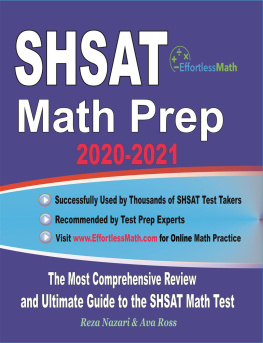
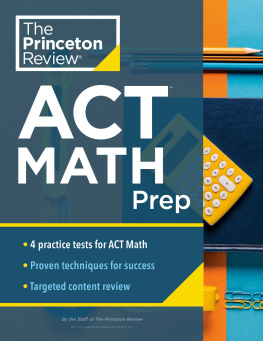
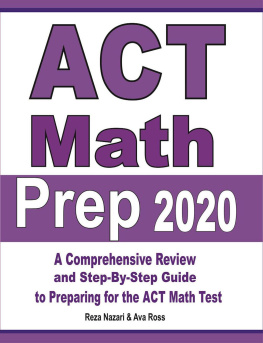
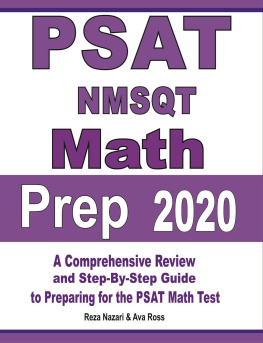
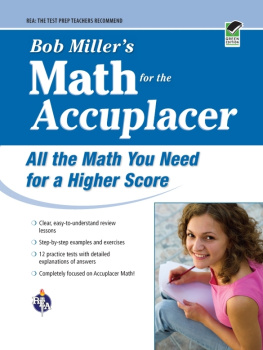
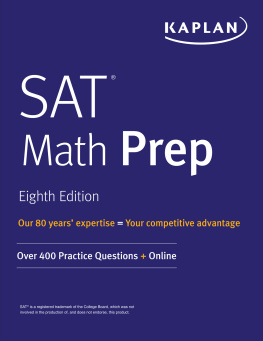
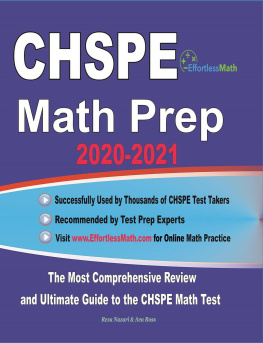
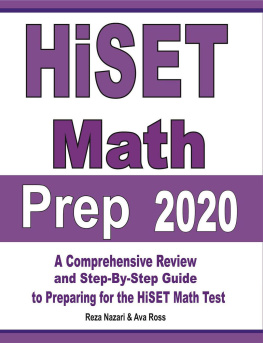
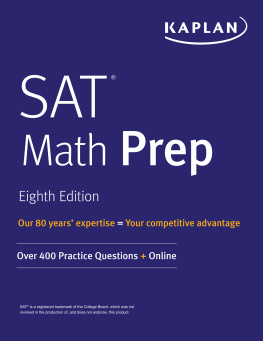
![Kristina Semos - Math 2 Cram Plan [SAT 2 Math Test Prep]: The Ivy Lounge Test Prep Guide to High-Speed, High-Impact Prep for the SAT II Subject Test in Math Level 2](/uploads/posts/book/162872/thumbs/kristina-semos-math-2-cram-plan-sat-2-math-test.jpg)
 Additional educational titles from Nova Press (available at novapress.net):
Additional educational titles from Nova Press (available at novapress.net):  GRE Prep Course (624 pages, includes software) GRE Math Bible (528 pages)
GRE Prep Course (624 pages, includes software) GRE Math Bible (528 pages)  Here are the approximate percentages of the content categories on the math section: 1) Pre-Algebra/Elementary Algebra (40%) 2) Intermediate Algebra/Coordinate Geometry (30%) 3) Trigonometry/Plane Geometry (23%) The math section is always the second section of the test.
Here are the approximate percentages of the content categories on the math section: 1) Pre-Algebra/Elementary Algebra (40%) 2) Intermediate Algebra/Coordinate Geometry (30%) 3) Trigonometry/Plane Geometry (23%) The math section is always the second section of the test.